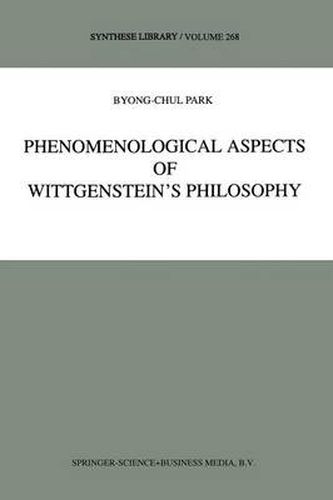Readings Newsletter
Become a Readings Member to make your shopping experience even easier.
Sign in or sign up for free!
You’re not far away from qualifying for FREE standard shipping within Australia
You’ve qualified for FREE standard shipping within Australia
The cart is loading…






This title is printed to order. This book may have been self-published. If so, we cannot guarantee the quality of the content. In the main most books will have gone through the editing process however some may not. We therefore suggest that you be aware of this before ordering this book. If in doubt check either the author or publisher’s details as we are unable to accept any returns unless they are faulty. Please contact us if you have any questions.
In his writings around 1930, Wittgenstein relates his philosophy in different ways to the idea of phenomenology. He indicates that his main philosophical project had earlier been the construction of a purely phenomenological language, and even after having given up this project he believed that the world we live in is the world of sense-data,,,l that is, of phenomenological objects. However, a problem is posed by the fact that he does not appear ever to have given a full, explicit account of what he means by his ‘phenomenology’, ‘phenomenological language’, or ‘phenomenological problems’. In this book, I have tried to unravel the nature of Wittgenstein’s phenomenology and to examine its importance for his entire work in philosophy. Phenomenology can be characterized as philosophy whose primary concern is what is immediately given in one’s experience. This ‘immediately given’ is not merely impressions inside one’s mind, but includes also the part of objective reality that impinges upon one’s consciousness. Thus, an aim of phenomenological enterprise is to grasp this objective reality by attending to immediate experience. Husserl’s phenomenology is in fact a case in point.
$9.00 standard shipping within Australia
FREE standard shipping within Australia for orders over $100.00
Express & International shipping calculated at checkout
Stock availability can be subject to change without notice. We recommend calling the shop or contacting our online team to check availability of low stock items. Please see our Shopping Online page for more details.
This title is printed to order. This book may have been self-published. If so, we cannot guarantee the quality of the content. In the main most books will have gone through the editing process however some may not. We therefore suggest that you be aware of this before ordering this book. If in doubt check either the author or publisher’s details as we are unable to accept any returns unless they are faulty. Please contact us if you have any questions.
In his writings around 1930, Wittgenstein relates his philosophy in different ways to the idea of phenomenology. He indicates that his main philosophical project had earlier been the construction of a purely phenomenological language, and even after having given up this project he believed that the world we live in is the world of sense-data,,,l that is, of phenomenological objects. However, a problem is posed by the fact that he does not appear ever to have given a full, explicit account of what he means by his ‘phenomenology’, ‘phenomenological language’, or ‘phenomenological problems’. In this book, I have tried to unravel the nature of Wittgenstein’s phenomenology and to examine its importance for his entire work in philosophy. Phenomenology can be characterized as philosophy whose primary concern is what is immediately given in one’s experience. This ‘immediately given’ is not merely impressions inside one’s mind, but includes also the part of objective reality that impinges upon one’s consciousness. Thus, an aim of phenomenological enterprise is to grasp this objective reality by attending to immediate experience. Husserl’s phenomenology is in fact a case in point.